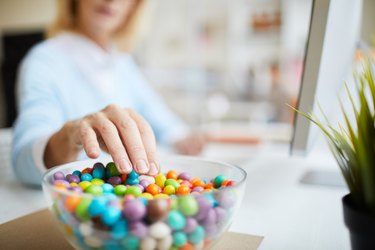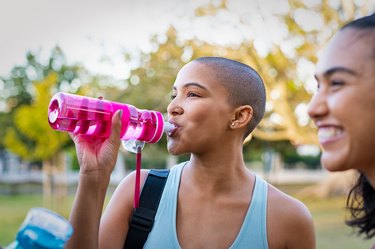
"You're a tall drink of water" isn't just a (really lame) pickup line (that nobody uses) — it actually pretty accurately describes your body. After all, you're made up of about 60 percent water, and water serves as a building material for each of your cells, according to the U.S. Geological Survey (USGS).
Drinking water is important for each of your body's systems. "Water helps food move through the GI tract, aids in the absorption and transportation of nutrients into cells, is vital for physical and mental performance and helps regulate body temperature, among other roles," dietitian Libby Mills, RDN, LDN, a spokesperson for the Academy of Nutrition and Dietetics, tells LIVESTRONG.com.
Video of the Day
Video of the Day
In other words: "In order to be on top of your game, you need to be fully hydrated," Mills says.
So, how can you tell if you're dehydrated? Here are some symptoms of not drinking enough water. If you notice any, fill your glass and drink up. "For most of us, having an extra glass of water makes sense," Mills says.
1. You’re Thirsty
While it may seem obvious, "thirst is the body's first natural cue that you need to have a drink of water, and it's a sign — at least to some degree — that there's some dehydration," Mills says.
What's happening, she explains, is a pretty cool physiological process: As dehydration sets in, electrolytes (minerals like sodium and potassium) in your bloodstream become more concentrated, which delivers a thirst cue to your brain. Saliva production also goes down, and that dry mouth feeling creeps in.
2. You’re Not Peeing as Much
As electrolytes concentrate in your bloodstream, your brain cues the pituitary gland to release anti-diuretic hormone, which instructs the kidneys to secrete less water and not produce as much urine, Mills says.
So, how often should you pee? That varies a bit by person and by day, but if you're properly hydrated, you should generally have to pee every three hours, according to the National Institute of Diabetes and Digestive and Kidney Diseases (NIDDK).
3. You Fail the Urine Test
Normal pee color is pale yellow, per the NIDDK.
If your urine is the color of one of those dark yellow "Yield Ahead" traffic signs or darker, you definitely need to hydrate, Mills says.
4. You Feel Sluggish
You got enough sleep last night and still, you're dragging today. "Being low on energy is a sign of dehydration," Mills says.
Water deprivation that resulted in mild dehydration was found to increase confusion and fatigue and decrease alertness in a small January 2013 cross-over study in The British Journal of Nutrition. But drinking water was able to immediately help participants feel more alert.
5. You’re Overly Snacky
You need to eat, and no one will ever tell you to drink water in place of eating. (Definitely not satisfying).
However, "people find that when they're properly hydrated, they can stay full longer between meals," Mills says.
There is some limited evidence that water drinking can assist in weight loss, though more research is needed, and the greatest effect is seen when people replace caloric beverages with plain water, per a December 2019 review of six randomized controlled trials in Nutricion Hospitalaria.
If you're feeling unusually snacky, having a glass of water first can't hurt, says Mills. (Of course, if you're still hungry afterward: eat!)
6. You Have a Headache
It's been a busy day, and you just can't be bothered to get up and refill your water bottle. And now, a headache has set in. Dehydration can trigger headaches and migraines, according to the National Headache Foundation.
If you get these regularly and know you're not drinking enough water to begin with, one of the tried-and-true natural remedies for headaches is to increase your daily H2O. Hydrating may not eliminate headaches completely, but it has been found to help reduce the negative effects migraines have on people's quality of life, per an August 2012 study in Family Practice.
7. Your Skin Is Dry
Your skin is made up of 64 percent water, notes the USGS.
"Water is a natural moisturizer for skin. And while healthy, moisturized skin looks beautiful, it also acts as a barrier to protect the body," Mills says.
You may notice dryness and crepiness in skin if you're dehydrated. Bumping up your water intake — if you're not drinking enough now — may help improve the health and hydration of skin, according to a small 2015 study in Clinical, Cosmetic and Investigational Dermatology.
Tip
The skin pinch test can also tell you if you're dehydrated: Gently pinch the skin on the back of your hand and hold for a few seconds; if it bounces back quickly, you're good in the H2O department. If it's slow to return to normal, that's a sign you need more fluids, per the U.S. National Library of Medicine.
8. You’re Constipated
Lack of fluids is a common cause of constipation, according to Johns Hopkins Medicine. Sipping more may be one natural remedy.
"Getting enough water will facilitate the entire digestive process, including elimination," Mills says.
Along with eating more fiber and getting regular physical activity, focus on hitting your water quota for better BMs.
So, How Much Water Do You Need?
Mills advises getting anywhere from 11 to 16 cups of water per day. That's right in line with what the Mayo Clinic recommends.
How to Drink More Water

It's not all about sipping plain H2O to hydrate. About 20 percent of your fluid needs can come from water-rich foods, like fruits, vegetables, soups, yogurt and oatmeal, Mills says.
Beyond that, be sure to:
- Drink water with meals.
- Sip water throughout the day. There are tons of refillable water bottles out there in varying sizes, shapes and functions (like those that use smart trackers to keep tabs on how much you're drinking). Finding one that you like to use could help you drink more.
- Know how you like to "take" your water. For instance, maybe you like ice-cold water, so an insulated water bottle may work best for you. Or, perhaps you like water that's infused with flavors like strawberry and mint — in that case, look for a bottle that has a built-in infuser.
- U.S. Geological Survey: “The Water in You: Water and the Human Body”
- National Institute of Diabetes and Digestive and Kidney Diseases: “Prevention of Bladder Control Problems (Urinary Incontinence) & Bladder Health.”
- Nutricion Hospitalaria: “Effect of water consumption on weight loss: a systematic review.”
- Family Practice: “A randomized trial on the effects of regular water intake in patients with recurrent headaches.”
- National Headache Foundation: “Headaches and Dehydration.”
- Clinical, Cosmetic and Investigational Dermatology: “Dietary water affects human skin hydration and biomechanics.”
- The British Journal of Nutrition: “Influence of progressive fluid restriction on mood and physiological markers of dehydration in women.”
- Johns Hopkins Medicine: “Constipation.”
- Mayo Clinic: "Water: How much should you drink every day?"
- U.S. National Library of Medicine: "Skin turgor"
Is this an emergency? If you are experiencing serious medical symptoms, please see the National Library of Medicine’s list of signs you need emergency medical attention or call 911.